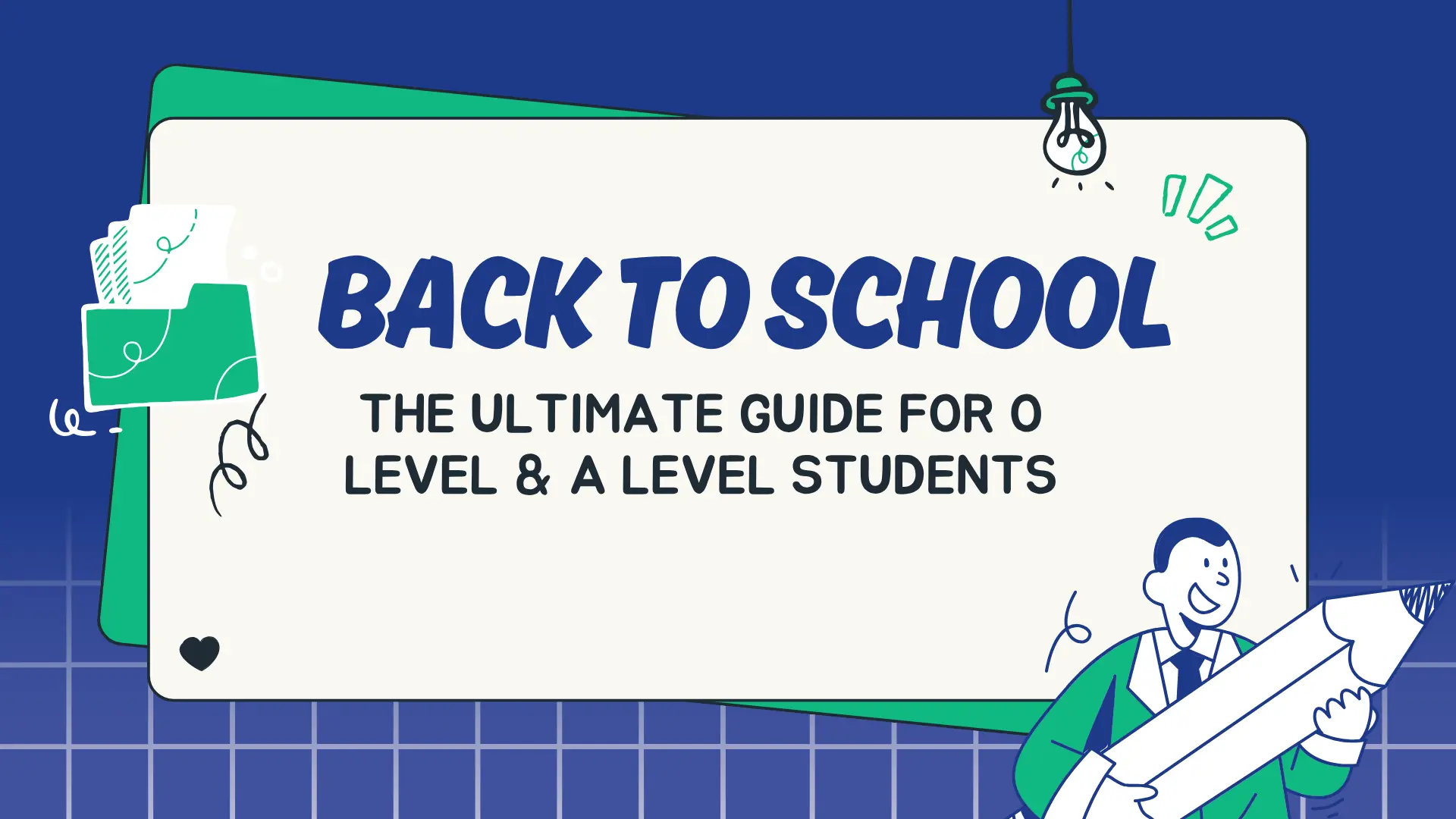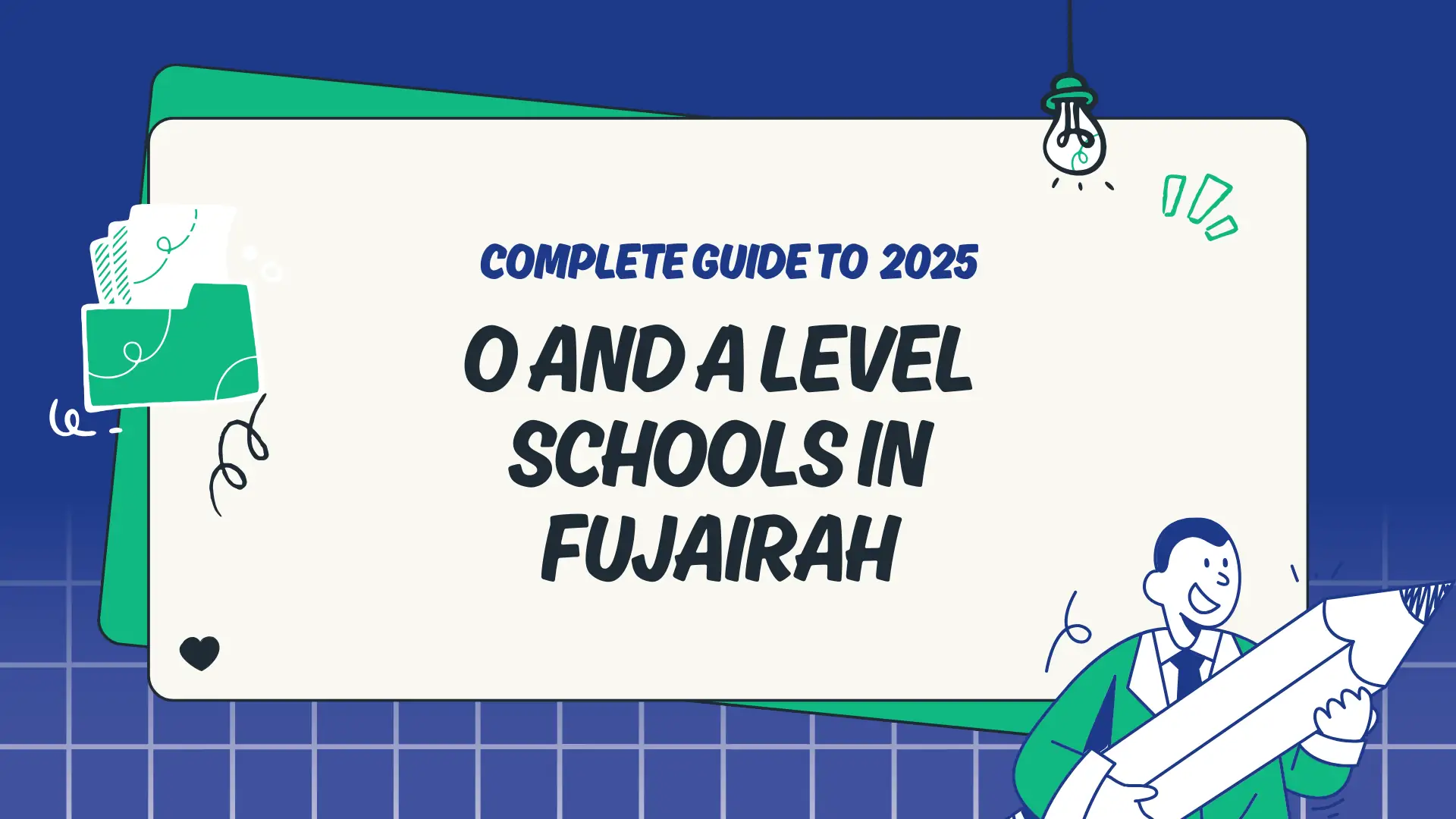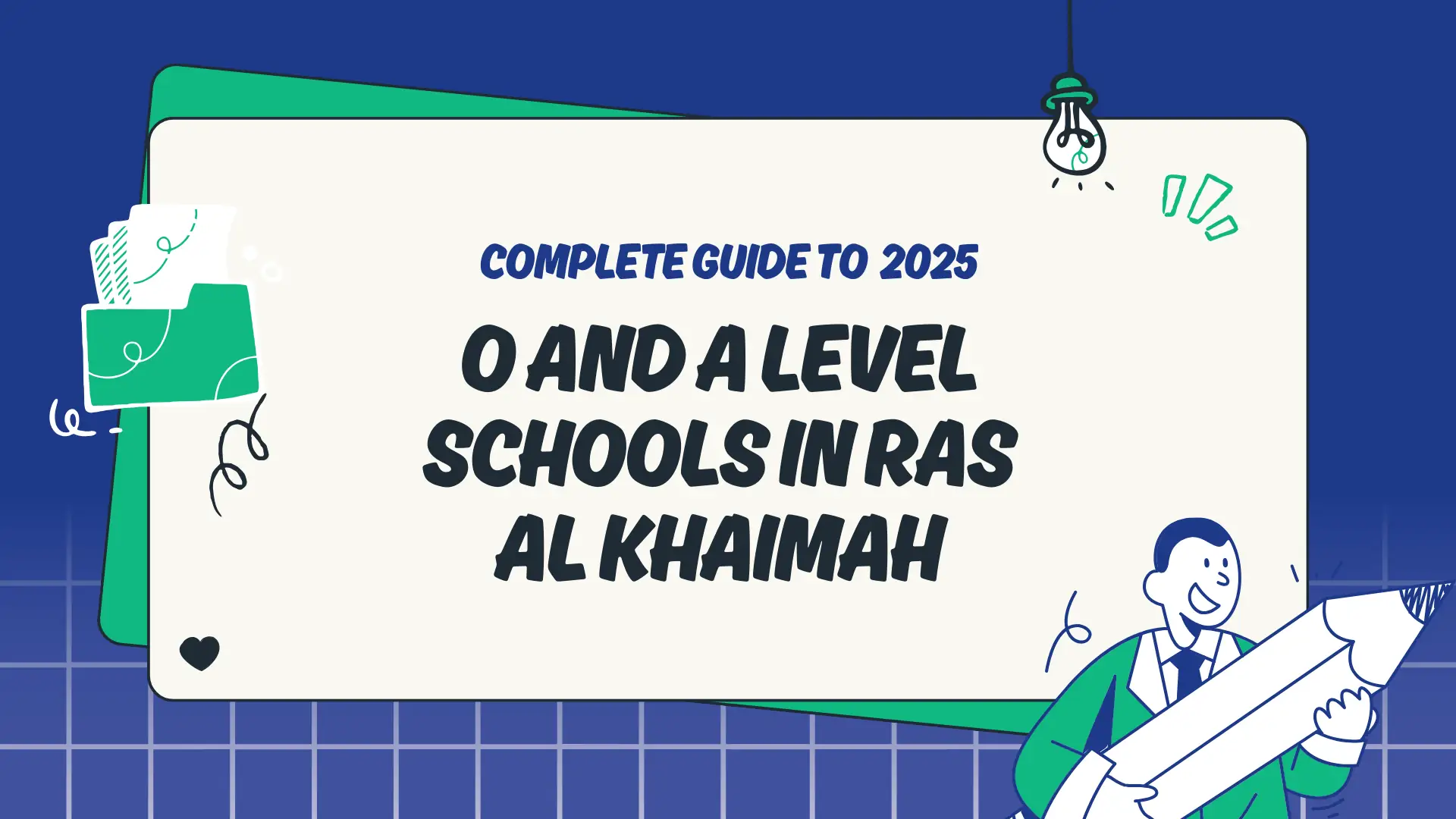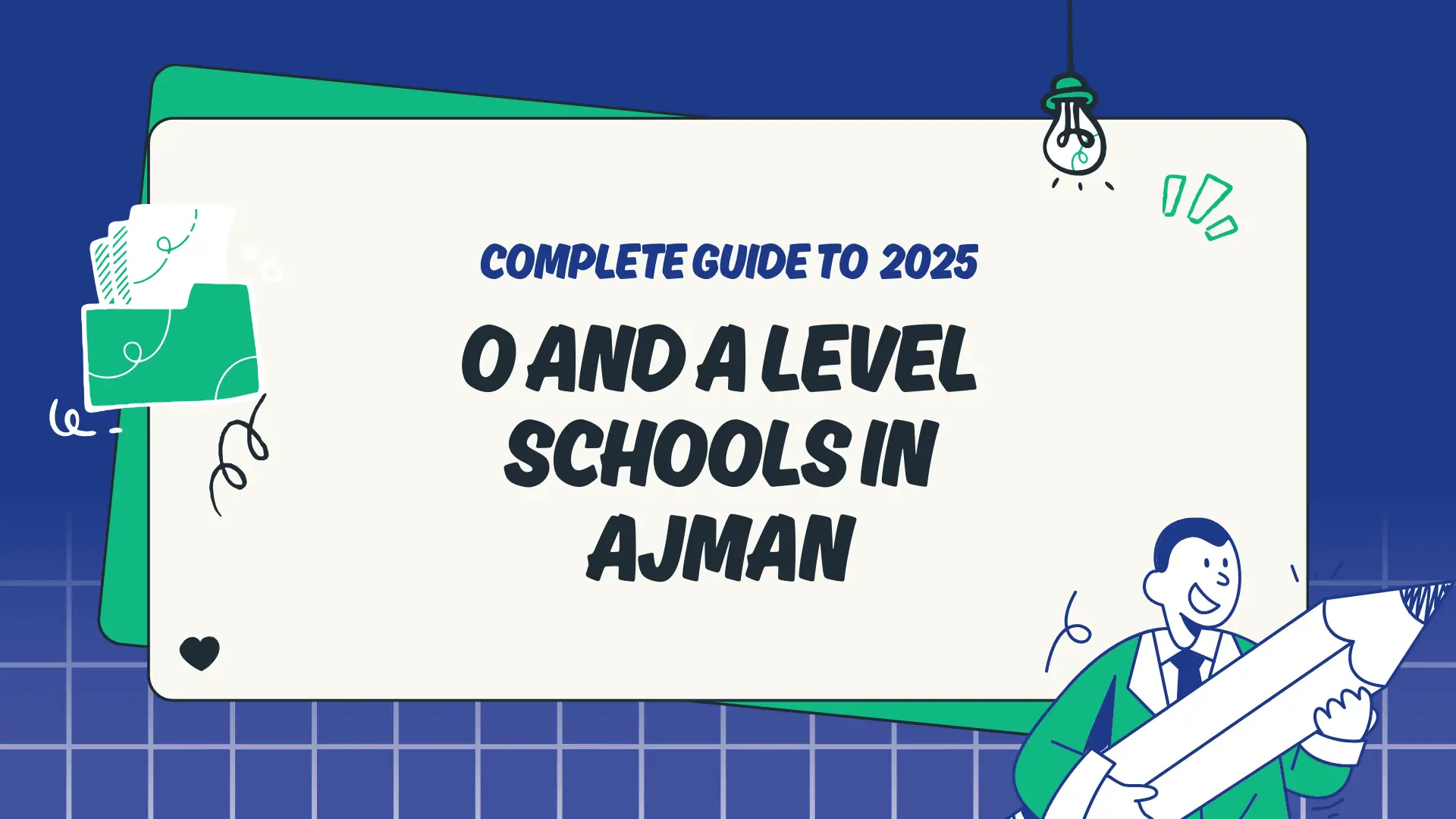As the summer holidays come to an end, students across the globe prepare to head back to school refreshed, recharged, and ready to take on a new academic year. For O Level and A Level students, this transition is more than just a return to books and classrooms; it’s the beginning of a critical phase that shapes their future goals, university plans, and career paths.
Whether you’re just stepping into the world of Cambridge O Levels or gearing up for your final year of A Levels, this guide is crafted to help you succeed. The start of a school year brings a unique opportunity to reassess your academic journey, overcome past challenges, and embrace new strategies for improvement.
From organizing your study schedule and setting realistic goals to managing exam stress and selecting the right subjects, this period is all about smart planning and strong focus.
In today’s competitive world, being academically prepared is only part of the equation. Time management, digital tools, emotional well-being, and personal motivation play an equally important role. That’s why we’ve created this comprehensive “Back to School” guide tailored specifically for O Level and A Level students.
Whether you’re starting your O Levels or continuing your A Level journey, the “back to school” season is the perfect time to reset, refocus, and recharge your educational goals.
Why the Back-to-School Season Matters?

The back-to-school season is more than just buying new stationery or returning to routine; it’s a powerful reset point in every student’s academic journey. For O Level and A Level students, this period holds particular significance, as it sets the tone for how the rest of the academic year will unfold.
A Fresh Start with Clear Goals
Coming back to school after a break allows students to reflect on their previous performance and set new academic and personal goals. It’s the perfect time to rethink your approach to studies, fix old habits, and adopt smarter learning techniques.
Crucial for Academic Planning
Whether you’re choosing your A Level subjects or preparing for your final O Level exams, the start of the year is key for laying down your academic roadmap. It’s when you can organize your syllabus, understand exam structures, and align your efforts with long-term goals like university admissions.
Reset Your Mindset
After a relaxing break, students often return with renewed energy. This mental refresh is essential to stay motivated and resilient throughout the demanding term ahead. A positive and focused mindset at the beginning can drastically reduce mid-year burnout.
Reconnect & Rebuild Relationships
Back-to-school season is also about reconnecting with classmates, building new friendships, and engaging with teachers. These relationships are not just socially important—they also form your academic support system during stressful times like mock exams and final assessments.
Build Good Habits Early
Time management, consistent revision, and self-discipline are habits that shape high-performing students. The beginning of the year is an ideal time to establish routines that last. A good start can create momentum that lasts till your final exam day.
For O Level and A Level students, this time is particularly crucial as it lays the foundation for your exam success and future university admissions.
O & A Level 2025 Results: Stay Informed & Prepared
The O Level and A Level 2025 results are expected to be announced between August and September 2025, depending on your examination board (CAIE, Edexcel, or AQA). Make sure you’re registered with your school’s exam office and keep your login credentials ready for result portals. Stay calm, remember results do not define your worth, and explore all your options, including remarking, retakes, or alternative pathways if needed.
O & A Level Equivalence in Pakistan
Students planning to pursue higher education in Pakistan must obtain IBCC Equivalence Certificates for their O and A Level qualifications. These certificates convert your grades into the local Matric and FSc system, allowing you to apply to Pakistani colleges and universities. Be sure to keep attested copies of your certificates and result slips ready when applying to IBCC for a smooth equivalence process.
Tips for O Level Students Starting a New Term

Here are a few Tips for Students:
1. Understand the Cambridge/O Level Curriculum
Before you dive into your textbooks and assignments, take time to understand the structure and expectations of the Cambridge O Level curriculum. This isn’t just helpful, it’s essential.
Cambridge O Level is an internationally recognized qualification that focuses on both theoretical knowledge and practical skills. Each subject has a specific syllabus that outlines:
- Topics to be covered
- Assessment objectives
- Types of exams (written, practical, coursework)
- Weightage of each paper
- Grading criteria
Why it matters:
Understanding the curriculum helps you plan your study schedule, identify important chapters, and prepare more effectively for both classroom learning and exams. It also gives clarity on what skills (such as critical thinking, problem-solving, and writing) are expected from you.
Tip:
Visit the official Cambridge Assessment International Education website or ask your teacher for the latest syllabus for each subject. Highlight the key objectives and exam formats so you can stay one step ahead from day one.
2. Organize Your Study Material
A well-organized student is often a successful one. At the beginning of your O Level term, take the time to gather, label, and sort all your study resources. This includes:
- Subject notebooks or binders
- Printed syllabus outlines
- Textbooks and past papers
- Handwritten notes or digital files
- A calendar or planner
Staying organized not only saves time but also reduces stress during exam season when you’re revising under pressure.
Why it matters:
Disorganized notes lead to wasted time, missed deadlines, and unnecessary panic. Having everything in place from the start helps you keep track of lessons, homework, assignments, and revision targets.
Tip:
Use color-coded folders or digital folders for each subject. Create a master Google Drive or OneDrive folder and back up your notes regularly. Apps like Notion, Evernote, or even Google Keep can help you stay digitally organized throughout the term.
3. Set SMART Goals
Goal-setting is one of the most powerful habits you can develop as an O Level student but not just any goals. You need to set SMART goals:
Specific, Measurable, Achievable, Relevant, and Time-bound.
Instead of saying “I want to do well in Physics,” try something like:
“I will complete and revise the first two chapters of Physics within three weeks, and solve at least 10 past paper questions on those topics.”
Why it matters:
SMART goals give you direction and purpose. They keep you focused, help you track your progress, and boost your confidence as you start achieving them one by one.
Tip:
Break long-term goals (like achieving an A grade) into short-term weekly or monthly goals. At the end of each week, review your progress and adjust your targets accordingly.
Bonus Tool: Use apps like Todoist, Trello, or even a simple paper planner to write down and track your SMART goals daily or weekly.
4. Build a Consistent Study Routine
Success in O Levels doesn’t come from last-minute cramming; it comes from consistency. Building a daily or weekly study routine helps you stay on track with your syllabus and reduces exam-time stress.
Start by creating a study timetable that balances:
- School hours
- Homework & assignments
- Self-study & revision
- Breaks & relaxation
- Sleep schedule
Why it matters:
A consistent routine turns study into a habit. Instead of struggling to find time or motivation, your body and brain will automatically adapt to your schedule. This increases focus, improves memory, and builds discipline over time.
Pro Tip:
Start small, maybe 1 hour of focused study after school. Gradually increase as needed. Use techniques like the Pomodoro method (25 minutes study, 5 minutes break) to avoid burnout and stay productive.
Bonus Tool: Try apps like Study Bunny, Forest, or a basic calendar to stick to your routine and track your study hours.
5. Practice with Past Papers and Marking Schemes
One of the most effective ways to prepare for O Level exams is by practicing past papers regularly. It gives you a clear idea of the question patterns, time management, and examiner expectations.
Start practicing with:
- Past 5–10 years of papers (especially topical ones)
- Marking schemes to understand how answers are graded
- Timed practice to simulate exam conditions
Why it matters:
Practicing past papers helps you identify your weak areas, improve your answer structure, and get comfortable with the exam format. It also builds confidence and reduces fear during the actual exam.
Pro Tip:
Use official Cambridge resources or trusted websites that provide updated past papers. After solving a paper, always check the marking scheme and examiner reports to understand how marks are awarded and what examiners look for.
Bonus Idea: Join or form a study group to discuss past paper questions. Explaining answers to peers reinforces your understanding even more.
Tips for A Level Students Getting Back on Track

Here are the Tips for A-level Students:
1. Revisit Past Topics
The transition into a new A Level term isn’t just about learning new chapters; it’s also about reinforcing what you’ve already covered. Before diving into fresh content, take time to go back and review your previous topics.
Start with:
- Your weakest topics first
- Summarized notes and concept maps
- Past questions related to older content
- Video lectures for deeper clarification
Why it matters:
A Level exams are conceptually demanding, and topics are often interconnected. For example, concepts from AS Level Physics or Chemistry are regularly tested in A2 exams. If your foundation is shaky, new chapters will become harder to understand.
Best Tip:
Make a revision checklist of all topics covered so far. Mark each topic as “Strong,” “Average,” or “Needs Revision,” and focus more on the weak ones. Use this review period to build confidence and strengthen your base.
Dedicate the first 2 weeks of the term to full-topic revision alongside new lessons to keep past knowledge fresh.
2. Update Your Notes and Organizers
A new term is the perfect time to refresh and restructure your notes. A Level subjects are deep and detailed, so having clean, well-organized, and up-to-date notes can make revision much easier later on.
Here’s how to update your study materials:
- Review and refine notes from the previous term
- Organize by topic, chapter, and subtopics
- Add diagrams, charts, and summaries
- Digitize handwritten notes if needed for better accessibility
Why it matters:
Updated notes help you see the bigger picture of the syllabus and make it easier to identify gaps in understanding. Organized materials also save time when exams are near—no more flipping through messy notebooks to find key concepts!
Best Tip:
Use apps like Notion, OneNote, or Google Docs to keep a clean digital archive. Tag each set of notes by subject and topic so you can search them easily when revising.
After each chapter, create a 1-page summary or a flashcard set. This is a game-changer for quick revision before tests or mock exams.
3. Master Time Management
Time is your most valuable resource at the A Level stage. How you use it determines your success. With complex subjects, regular assessments, and university plans, mastering time management is a must.
Here’s how to stay on top of your schedule:
- Create a weekly study plan that balances classwork, homework, revision, and rest
- Set specific time blocks for each subject or task
- Avoid multitasking, focus on one thing at a time
- Prioritize tasks using tools like the Eisenhower Matrix (urgent vs. important)
Why it matters:
A Level exams test your depth of understanding, not just your memory. That requires consistent, focused effort over time. Good time management helps prevent burnout, reduces last-minute panic, and ensures you cover every topic thoroughly.
Tip:
Use the Pomodoro technique (25 minutes of focused work, 5-minute break) for better focus and less fatigue. You can also track your study hours using apps like Clockify, MyStudyLife, or even a simple Google Calendar.
Bonus Idea: On Sundays, plan your entire week, set study targets, mark upcoming tests, and schedule breaks. This weekly planning ritual will keep you ahead and in control.
4. Engage in Deeper Learning
At A Level, surface-level studying won’t cut it. Success comes from deep understanding, not just memorization. You’re expected to apply concepts, evaluate ideas, and make connections across topics, especially in subjects like Economics, Biology, Physics, and Literature.
Here’s how to build deeper understanding:
- Ask “why” and “how” questions, don’t just memorize facts
- Connect new topics to previous knowledge
- Teach the concept to someone else (or pretend to it works!)
- Use real-life examples to apply abstract concepts
Why it matters:
Examiners look for critical thinking, clear argumentation, and logical reasoning. Deeper learning trains your brain to think analytically and handle tricky, application-based exam questions.
Tip:
Use active learning techniques like mind maps, concept trees, and question banks. Instead of passively reading notes, quiz yourself, write summaries, and explain difficult ideas in your own words.
Bonus Idea: Watch expert explanations on YouTube (like CrashCourse or Khan Academy) or join discussion forums to hear how others break down complex ideas. Exposure to multiple perspectives sharpens your grasp on tough topics.
Mental Preparation & Motivation
Here are some mental preparations and motivational points for students:
Beat the Back-to-School Blues
Going back to school after a long break isn’t always easy. The sudden shift from relaxed holidays to busy schedules, deadlines, and exam pressure can feel overwhelming. That’s why it’s essential to mentally prepare and build a positive mindset before diving into your academic routine.
- Create a Motivating Study Space
Design a space that inspires focus and calm. Keep it clutter-free, well-lit, and equipped with everything you need. Add personal touches like quotes, photos, or plants to keep it inviting.
- Make a Playlist of Focus Music
Instrumental music, lo-fi beats, or classical tunes can help you concentrate and stay relaxed while studying. Try apps like Spotify or YouTube to find study-specific playlists.
- Set Weekly Mini-Rewards
Break your big goals into smaller weekly targets. When you hit those targets, reward yourself! Whether it’s a sweet treat, screen time, or a hangout with friends, positive reinforcement works.
Returning from holidays can feel overwhelming; the change in pace, early mornings, and academic pressure can hit hard. But with a few small steps, you can ease back into your routine with confidence and clarity.
Stay Mentally Healthy
Academic success means nothing without mental well-being. A healthy mind helps you learn better, stay motivated, and cope with pressure.
- Take Regular Breaks
Avoid burnout by following the 50/10 rule (50 minutes of study, 10 minutes of rest). Use this time to stretch, walk, or hydrate.
- Practice Mindfulness or Journaling
Just a few minutes of mindfulness, deep breathing, or reflective writing each day can calm your mind and help process thoughts and emotions.
- Talk to Someone
If you’re feeling anxious, stressed, or low don’t bottle it up. Speak to a trusted friend, parent, or school counselor. You are not alone.
Connect with Teachers & Peers
Strong academic relationships create a support system that can guide you throughout the year.
- Don’t hesitate to ask questions or request help.
- Participate in class discussions.
- Join or form study groups for collaborative learning.
- Share notes, resources, and motivation with classmates.
Why it matters: Engaging with your academic community keeps you connected, confident, and supported, especially when challenges arise.
Back-to-School Checklist for O Level & A Level Students

Use this checklist to stay prepared, organized, and motivated as you start your new academic term:
1. Academic Essentials
- Collect updated syllabi for each subject
- Organize textbooks, notebooks, and past papers
- Set up subject-wise folders (digital or physical)
- Print or save exam timetables (if available)
- Create a basic study timetable
2. Study Planning
- Set SMART goals (weekly, monthly, term-wise)
- Identify weak topics for early revision
- Update notes from the previous term
- Plan review sessions for past chapters
- Start solving at least one past paper per week
3. Digital Tools & Resources
- Install study apps (Notion, Google Calendar, Forest, etc.)
- Join relevant study groups/forums (WhatsApp, Discord, Facebook)
- Bookmark helpful resources (e.g., SaveMyExams, Physics & Maths Tutor)
- Organize digital notes in Google Drive or OneDrive
4. Personal Preparation
- Set up a clean, distraction-free study area
- Make a focus/study music playlist
- Create a vision board or post motivational quotes
- Schedule weekly breaks and rewards
- Re-establish a consistent sleep routine
5. Health & Well-being
- Plan healthy meals/snacks for energy
- Schedule time for physical activity (even 15 mins daily)
- Practice mindfulness, journaling, or breathing exercises
- Reach out to a friend, teacher, or counselor if feeling stressed
- Set boundaries for screen time and social media
Print this checklist and tape it to your study wall or desk. Check items off during your first week back to school to stay on track and motivated!
Quick Tips for Parents
Parents play a crucial role in their child’s academic journey, especially during the demanding O Level and A Level years. Here are a few simple yet powerful ways you can support your child’s success:
Create a Supportive Home Environment
Ensure your child has a quiet, well-lit, and distraction-free space for studying. A calm and organized environment promotes focus and consistency.
Encourage Open Communication
Talk to your child regularly about school, their challenges, and achievements. Listen without judgment so they feel safe sharing academic or emotional concerns.
Monitor Study Schedules
Help your child stay on track with a balanced routine. Offer gentle reminders and check-ins, not micromanagement, to encourage responsibility and discipline.
Avoid Unnecessary Pressure
Support your child emotionally rather than focusing solely on grades. Every student learns differently, and your belief in them can be the biggest motivator of all.
Your support, patience, and encouragement can make all the difference in helping your child not only succeed academically but also stay happy, confident, and mentally strong.
Conclusion
The start of a new school term is more than just returning to classes; it’s a chance to reset, refocus, and rise. Whether you’re entering O Levels or preparing for your final A Level exams, this is your opportunity to build better habits, set meaningful goals, and take control of your academic journey.
From mastering your syllabus and creating smart study routines to taking care of your mental well-being and staying connected with teachers and peers, every small step counts. Consistency, self-belief, and support from your environment (including your parents and mentors) will be your strongest allies this term.
Success isn’t about being perfect; it’s about progress. So don’t fear setbacks, embrace the process, and stay motivated. The effort you put in today will shape the results you achieve tomorrow.
You’ve explored how to build a solid study routine, set SMART goals, manage your time, review past topics, and protect your mental well-being. You’ve seen the value of past papers, the power of deep learning, and the importance of staying connected with peers, teachers, and even parents.
Back to school isn’t just a return, it’s a new beginning. Whether you’re stepping into the world of O Levels or advancing through A Levels, now is the time to bring energy, discipline, and curiosity into your academic life. Your future is shaped by what you do today, so sharpen your pencils, open your books, and get ready to own this school year!
Frequently Asked Questions (FAQs)
What’s the best way to start the new school term for O-Level and A Level students?
Start by organizing your study materials, setting SMART academic goals, and reviewing the syllabus. Create a structured daily routine early on and stick to it. This helps reduce anxiety and ensures you’re ready for the challenges ahead.
How can I stay motivated throughout the academic term?
Set short-term goals and reward yourself when you achieve them. Use visual aids like progress charts or planners, and listen to motivational or focus music. Most importantly, keep your long-term academic and personal goals in sight.
What are SMART goals, and why are they important for students?
SMART goals are Specific, Measurable, Achievable, Relevant, and Time-bound. They help students stay focused, track their progress, and avoid burnout. By breaking big objectives into smaller ones, you make learning more manageable and effective.
Why is time management critical in O and A Levels?
With multiple subjects and extensive syllabi, time management helps prevent last-minute cramming and missed deadlines. Learning to prioritize tasks and stick to a study timetable can dramatically improve performance. It’s a life skill that extends beyond academics.
How can I mentally prepare myself for the new academic year?
Create a calm study space, start with light revision, and ease into your routine. Practice mindfulness, take breaks, and don’t ignore your mental health. Remember, a calm and focused mind is essential for learning and retaining knowledge.
How should A Level students revise past topics effectively?
Use active recall, flashcards, and past paper practice to strengthen your understanding. Break larger topics into smaller sections and revise in intervals. Repetition and spaced learning are key techniques to mastering advanced-level concepts.
What tools or resources help with deeper learning at A Levels?
Use academic journals, educational videos, group discussions, and critical thinking exercises. A Levels demand analysis and application, so go beyond textbooks. Engage with your subjects through essays, debates, and real-world examples.
How can parents support their O/A Level children during back-to-school time?
Parents should provide a quiet study space, show interest in their child’s academic progress, and encourage balanced routines. Avoid putting pressure and instead build an open communication channel where the child feels safe and motivated.
What’s the role of teachers and classmates in academic success?
Teachers guide you through the syllabus and help clear up confusion, while classmates can support collaborative learning. Asking questions, joining study groups, and participating in class create a dynamic learning environment. You don’t have to go through it alone.
How do I overcome stress and anxiety during the school year?
Talk to someone, a friend, a parent, or a counselor, when stress builds up. Practice time management, ensure proper sleep and nutrition, and take regular breaks. Remember, your mental well-being is just as important as your academic results.









Leave a comment